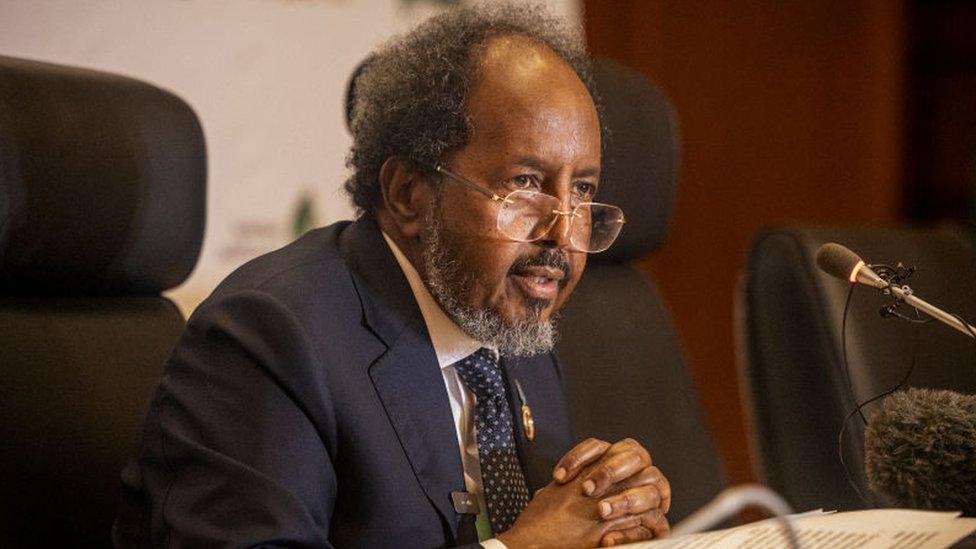Somalia expels Ethiopian ambassador amid row over Somaliland port deal
- Published

Somalia's President Hassan Sheikh Mohamud has condemned the port deal between Ethiopia and Somaliland
Somalia has expelled the Ethiopian ambassador from the country and ordered the closure of two consulates.
It accused Ethiopia of infringing on Somalia's "sovereignty and internal affairs".
Somalia also recalled its ambassador from Ethiopia's capital, Addis Ababa, for "comprehensive consultations".
Ethiopia's foreign ministry spokesperson Nebiyu Tedla told Reuters news agency the government did not have information on the matter.
The expulsion highlights an escalation in diplomatic tensions in the region following land-locked Ethiopia's port deal with the self-declared republic of Somaliland earlier this year.
Its independence has not been internationally recognised and Somalia condemned the deal as an attack on its sovereignty.
In January, Ethiopia signed a deal with Somaliland to lease a 20km (12 miles) strip of coastline, so it could build a navy base.
The deal is not legally binding, though it is seen as a statement of intent and can lead to a treaty imposing obligations on those parties who have signed.
In exchange, Ethiopia reportedly told Somaliland it would offer it possible recognition in the future - which angered Somalia.
Somaliland seceded from Somalia more than 30 years ago, but is not recognised by the African Union (AU) or the UN as an independent state.
Following this deal, Somalia's President Hassan Sheikh Mohamud launched a diplomatic campaign and travelled to Eritrea and Egypt- two countries with fraught relations with Ethiopia.
Somalia demanded a public reversal of the deal by Ethiopia but this has not happened.
Somalia has described the deal as an act of aggression, adding that it was an "impediment to… peace and stability".
Earlier this week Ethiopian delegates met officials from the semi-autonomous Somali province of Puntland, which has difficult relations with the central government.
This year Puntland said it would operate as a functionally independent state amid a dispute over Somali constitutional changes.
The two Ethiopian consulates that Somalia has ordered to close are in Hargeisa and Garowe, the capitals of Somaliland and Puntland, respectively.
The prospect of armed clashes between the two countries seems unlikely at this point. Ethiopia is one of the countries contributing soldiers to an AU peacekeeping mission in Somalia, which complicates the situation.
There are already concerns that the Islamist group al-Shabab might be using tensions between the two countries to recruit fighters and increase security threats.
Escalations in the row between Somalia and Ethiopia could only worsen that.